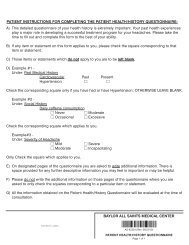Fall 2011 - Baylor Health Care System
Fall 2011 - Baylor Health Care System
Fall 2011 - Baylor Health Care System
You also want an ePaper? Increase the reach of your titles
YUMPU automatically turns print PDFs into web optimized ePapers that Google loves.
With Prostate Cancer,<br />
Age Matters<br />
Prostate cancer is second only to skin cancer in the<br />
number of men affected in the United States. According<br />
to the American Cancer Society (ACS), more than<br />
240,000 new prostate cancer cases will be diagnosed in<br />
men in <strong>2011</strong>, with 15,630 of these in Texas.<br />
New Prostate Cancer Screening Guidelines<br />
Prostate cancer rarely affects men before age 40, but<br />
chances increase rapidly after 50. Traditionally, age 50<br />
has been the recommended age to begin having prostate<br />
cancer screenings. The prostate cancer screening<br />
includes a digital rectal exam (DRE) and a prostatespecific<br />
antigen (PSA) blood test. Now, the American<br />
Urological Association (AUA) recommends a<br />
baseline screening at age 40.<br />
“This earlier screening allows us to get a good baseline<br />
PSA number,” says W. Scott Webster, MD, chief of<br />
urology and a urologist on the medical staff at <strong>Baylor</strong><br />
University Medical Center at Dallas. “If anything is<br />
detected, it typically identifies a young man with significant<br />
disease. If we wait until age 50 to begin screenings,<br />
some men with cancer could have already developed<br />
metastasis or spreading of the cancer.”<br />
Monitoring Elevated PSA Levels<br />
Detecting problems at an early stage may not mean<br />
immediate treatment. “Many patients are diagnosed<br />
with prostate cancer but may require no other treatment<br />
than surveillance,” says Dr. Webster. “We may<br />
repeat the PSA test every three months and conduct a<br />
biopsy at one year. Then, we can base treatment decisions<br />
on any changes.”<br />
Determining when to treat prostate cancer is based<br />
on a number of factors including the patient’s age and<br />
overall health. “Treatment for prostate cancer can have<br />
side effects that can adversely affect a man’s quality<br />
of life,” says Matthew Shuford, MD, urologist on the<br />
medical staff at <strong>Baylor</strong> Dallas. “Men with a low-grade<br />
tumor may choose, with their physician’s guidance, to<br />
monitor their tumor to avoid issues such as impotence<br />
and incontinence. Also, men with a life expectancy of<br />
less than ten years due to other conditions such as heart<br />
disease may not require treatment.<br />
“All men should speak with their primary care physician<br />
or urologist to determine their risk and when<br />
they should begin prostate cancer screening,” says Dr.<br />
Shuford. “You need to understand your situation and be<br />
proactive when it comes to your own prostate health.”<br />
Prostate Cancer Risk Factors<br />
Men at a higher risk for developing prostate cancer<br />
should be especially diligent about talking with their<br />
physician about early screening at age 40.<br />
Those at high risk include:<br />
• African-American men<br />
• those with a first-degree relative or multiple<br />
family members diagnosed with prostate<br />
cancer before age 65<br />
Now, the American Urological Association<br />
recommends a baseline screening for<br />
prostate cancer at age 40.<br />
12

















